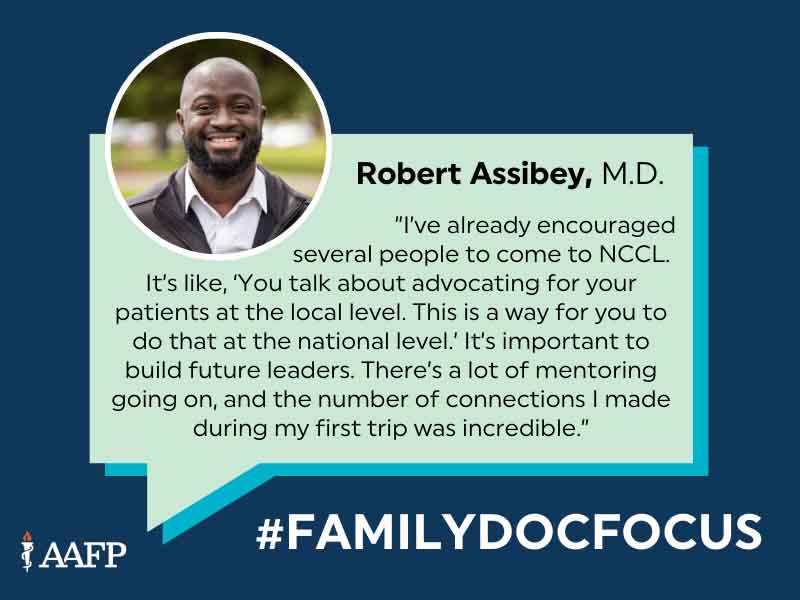New Physician Is Ready to Lead, Represent Peers Nationally
Feb. 5, 2025, David Mitchell — Robert Assibey, M.D., had never been to the AAFP’s National Conference of Constituency Leaders before attending last April’s event in Kansas City, Mo. That didn’t stop him from throwing his hat into the ring at NCCL, where several national leadership roles are determined.
“I was a new physician director for the California Academy for three years prior to going to NCCL, so I’d already been functioning in that space,” said Assibey, an associate program director for the family medicine residency at San Joaquin General Hospital in French Camp, Calif. “I’d already written resolutions and represented this group at the state level, and I knew I wanted to do more.”
NCCL is a leadership development event for women; new physicians; international medical graduates; members who are Black, indigenous and people of color; and LGBTQ+ physicians and allies. The event is part of the AAFP Leadership Conferenence, along with the Annual Chapter Leader Forum, which is a developmental program for chapter-elected leaders and chapter staff.
Assibey will serve as new physician co-convener with Tabatha Davis, M.D., FAAFP, of Lynchburg, Va., when NCCL is held April 24-26 in Kansas City, Mo. He and Davis already represented new physicians as constituency alternate delegates to the Congress of Delegates when the AAFP’s policymaking body met in September in Phoenix. They will be the constituency’s delegates when COD meets again Oct. 4-6 in Anaheim, Calif.

“It was amazing, powerful and moving,” he said of his first COD. “I’m excited to do it again as an actual delegate this year. It’s pretty cool the way the AAFP does it, allowing the co-conveners to serve as alternate delegates and then delegates. It gives you a good outlook and experience. I’ve already encouraged several people to come to NCCL. It’s like, ‘You talk about advocating for your patients at the local level. This is a way for you to do that at the national level.’ It’s important to build future leaders. There’s a lot of mentoring going on, and the number of connections I made during my first trip was incredible.”
Assibey knows about mentoring. After earning his undergraduate degree at the University of Virginia, where he was a track and field athlete, Assibey went to work while preparing for the Medical College Admission Test. To pay the bills, he took a job as an emergency medical technician while also serving as a substitute teacher and basketball coach at a Los Angeles charter school.
“As a resident you start teaching the students,” he said. “That brought me back to my old teaching days, and I thought, ‘This is something I thoroughly enjoy, giving back to the future generation while also taking care of my own patients.' That played a huge role in me going into academic medicine and staying at the program where I trained. I owe everything to this program, which took me in and taught me so many things. It’s allowed me to grow, not just as a physician but also as a person, and has allowed me to do things with the state and national academies that have been life changing.”
In addition to his role as an associate program director, Assibey is medical director for a mobile medical service, manages a skilled nursing facility for geriatric patients and owns and manages a wound care company that treats patients in their homes.
His philosophy and work ethic aren’t surprising given that both of Assibey’s parents were home health nurses who had to repeat training and licensing after immigrating from Ghana.
“My motto is, ‘Meet patients where they are, and treat them where they are,’” he said. “That’s true whether it's my addiction medicine practice, our homeless outreach or geriatric homebound patients. If they can’t come to us, we’ve got to go to them. The ultimate end goal is, how can I reach the most patients possible with the abilities that I have. God granted me the ability to take care of patients and to be in this position, so I’m trying to do the best I can with what I have.”
Assibey’s broad practice hasn’t gone unnoticed by his students and residents.
“They see how many jobs I have,” he said, “and they’re like, ‘What are you doing?’ But I like the flexibility. When you’re in med school and they tell you what a family doctor is, it’s literally somebody who loved every single rotation. When you choose family medicine, you can do it all. I tell the students and residents I work with how cool it is to be a family doc. Some of them have asked me if I could do it over again, would I choose the same specialty? I would, 1,000%.”